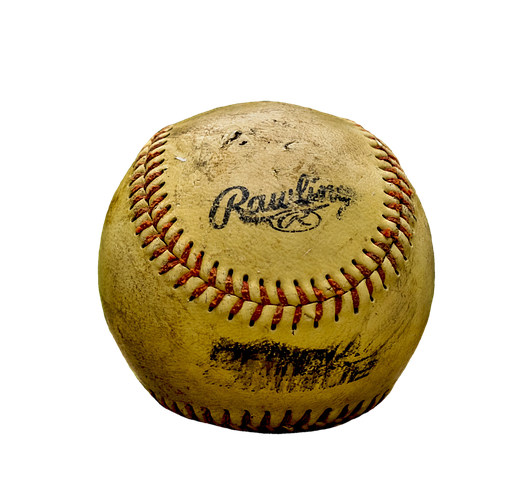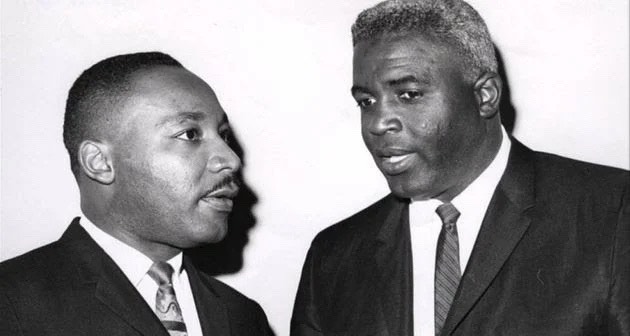By Fatoumata Drammeh
Jackie Roosevelt Robinson is well known for his contributions to Major League Baseball not only as an extremely talented player but also as the first prominent black figure to break racial segregation within the sport. With his star power and tremendous resilience, Robinson made history by breaking the “Color Barrier” and becoming the first modern day African American baseball player for the Brooklyn Dodgers. (oa-bsa.org).
Yet his important achievements don’t stop there. Jackie Robinson not only set a course of change for himself, he blazed a path for others to follow and flourish within. He never stopped fighting to demolish racial barriers even after he himself achieved personal success, because he understood there was much more that needed to be done. After integrating baseball, Robinson became a devoted leader in the civil rights movement, using his high profile to attract more attention to the injustices black people were facing. As a board member for the NAACP he worked on numerous campaigns, notably, the “Fight For Freedom” in which he and others advocated abolishing all segregation and discrimination while raising money to support these efforts.
Robinson would travel constantly to meet with other African Americans fighting against racism to support and encourage their efforts within the community. This was vital, as the social climate in America at the time was aggressively racist, and quite hostile towards civil rights activism. It was important to ignite confidence and increase collective morale amongst those working for social justice to ensure their persistence in the struggle for equality. Robinson and his wife would even host unifying social gatherings for activists, to decrease any brewing tensions or disagreements between them.
Education is a powerful tool to empower the youth of tomorrow, and Jackie Robinson was one of the many African Americans who understood the need to secure for young black children the right to an equal education. In many places, Black children were still denied entry to the best public schools as state officials tried to ignore Federal desegregation laws. When black children arrived to desegregate all white public schools, local cops and white civilians were often allowed to threaten and physically harrass these children. In 1957, Robinson was the Vice President of a big corporation called “Chock full O’Nuts” and used this executive power to push for equal access and social equality within public schools. He sent a letter to President Eisenhower about his frustration with the president’s failure to take action to combat American racism and thereby ensure the rights of African American citizens.
Robinson’s efforts didn’t stop there, as every president in office between the years of 1956 to 1972 received similar letters. Robinson courageously refused to settle for the minimal efforts made by elected officials, and pushed every U.S. president to use their office to defend the constitutional rights of African Americans. Robinson didn’t care about party affiliations or promises; he prioritized a president’s duty to enforce universal civil rights. This kind of passionate, non-negotiable attitude was integral to removing racial barriers within America.
Robinson notably joined Dr. Martin Luther King in his efforts to lead civil rights campaigns in Birmingham. He along with MLK and fellow activists planned the Youth March for Integrated Schools that successfully gathered ten thousand souls for this non-violent march. While there, he went to even greater lengths to raise money to help church officials rebuild burned black churches. His wife and he would continue to raise funds for similarly good causes.
Jackie Robinson was no stranger to putting himself in harm’s way to protest against injustice, and did this even before he integrated baseball. During his school years in college he was arrested for standing up for his friend who was mistreated by the police. Then in the early 1940s, after he was drafted into the military—and well before the famous Rosa Parks incident—Robinson refused to give up his seat to a white soldier on a military bus. He argued for his rights but he was arrested and his courage was apparent.
The Robinsons worked to tackle other facets of racial segregation beyond buses and schools. Frustrated with white banks refusing to loan money to African Americans and/or imposing higher interest rates on non-whites, Robinson took action to solve this issue and participated in founding and directing the Freedom National Bank to give black people access to a bank of their own. Before it closed it was a great success, and had become the largest black-owned bank in the state of New York. Robinson would also help in decreasing the lack of housing for low-income families when he spearheaded the Jackie Robinson Construction company.
 Besides being a legendary baseball player, Robinson notably wielded multiple positions of power and influence as a board director, a businessman, an actor, and an author. He did all of this as a black man in a society deliberately rigged against him. Despite systemic racism and even despite daunting threats on his life, Robinson rose above these obstacles to advance the quality of life for all African Americans. That’s why Jackie Robinson is a brilliant role model for the black community. He didn’t just dream of change, he took action and actually created real solutions to real issues.
Besides being a legendary baseball player, Robinson notably wielded multiple positions of power and influence as a board director, a businessman, an actor, and an author. He did all of this as a black man in a society deliberately rigged against him. Despite systemic racism and even despite daunting threats on his life, Robinson rose above these obstacles to advance the quality of life for all African Americans. That’s why Jackie Robinson is a brilliant role model for the black community. He didn’t just dream of change, he took action and actually created real solutions to real issues.
Over and above his career in sports, Robinson’s loyalty to his people and his persistence in the collective fight to end racial injustice stands out as his most notable achievement. Indeed, Robinson’s example inspires modern athletes like Colin Kaepernick—as well as young activists like myself—to continue to build upon his pioneering efforts.
Photo Credits:
Slideshow: Dreamtime
First image: Huffington Post
Second Image: Pixabay
